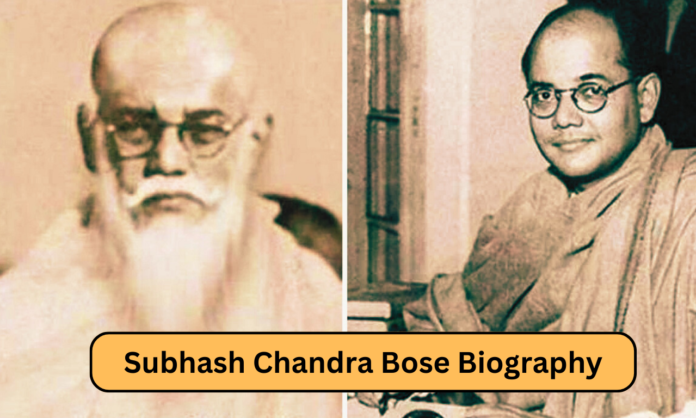Subhash Chandra Bose Biography
Subash Chandra Bose was a great freedom fighter. He was also known as ‘Netaji.’ He was born in Cuttack in a Hindu family. He was a brilliant student in the school. He completed his schooling from Cuttack, 10th from Kolkata, and BA from the University of Calcutta.
His father sent him to England to appear in the Indian Civil Services (ICS) examination. He passed and joined the service, but soon, he resigned from the Indian Civil Services and returned to India to participate in the freedom movement.
He was very much influenced by the nationalist Des Bandhu Chittaranjan Das, who was his political guru. He motivated the people to join the freedom struggle. Subash Chandra Bose strongly opposed British Rule through a newspaper called ‘Swaraj.’
He went away to Singapore and formed his own “Indian National Army” (INA), also known as “Azad Hind Fauz.” He gave his army the “Delhi Chalo” and “Jai Hind” slogans. He wanted to free his country from British rule.
Subhash Chandra Bose Life Story (From 1897-1921)
Subash Chandra Bose belonged to a Bengali family. His mother was Prabhavati Bose, and his father was Janakinath Bose in Cuttack. Today, Cuttack is in Orissa. At that time, it was included in Bengal Province. His father was a successful lawyer and was loyal to the British Government. His father sent him to England for “ICS.” It was a love for the country that brought him to India in the year 1921, and a new student was selected.
Check Also
When Did Subhash Chandra Bose Join the Indian National Congress? (1921-1932)
In the beginning, he was greatly influenced by the ideologies and principles of Mahatma Gandhi. After coming back from London, he arranged an interview with Mahatma Gandhi. He threw a volley of questions at Mahatma Gandhi, and in the first meeting, Mahatma Gandhi and Subhash Chandra Bose were of different opinions.
Gandhiji believed in non-violence, whereas Subhash Chandra Bose believed in accepting all means to serve anti-colonial ends. Bose’s model of Independence was a totalitarian end. Despite having differences with Bose Gandhiji, they made him the leader of the Indian National Congress and a nationalist in Bengal. C.R. Das established Bose in national politics. Bose served the Indian National Congress for nearly 20 years.
Bose started the “Swaraj” newspaper. In 1923, Subash was elected a leader of the Indian Youth Congress. He was also a secretary of the Bengal State Congress. Chitranjan Das has started a newspaper called “Forward.” Subash Chandra became the editor of that newspaper. Bose worked as an activist, arrested and imprisoned.
After being freed from imprisonment, the Congress party made him the general secretary, where he joined Pt. Jawahar Lal Nehru. In 1928, Bose organized the annual meeting at Calcutta. Later, he became the General Officer Commanding (GOC) in the Congress Volunteer Corps. He managed uniforms for volunteers. Officers were provided steel-cut-epaulets. The differences with the Mahatma Gandhi Session at the Calcutta meeting caused great disappointments among the Bengalis.
A bit later, Subash was again arrested and jailed under civil disobedience. At this time, he was the Mayor of Calcutta in 1930.
Check Also – Netaji Shubhas Chandra Bose Inspirational Quotes
Why was Subhash Chandra Bose Roaming to Other Countries? (1937-1940)
Till the tear 1938- Bose became a leader at the national level. He also became the President of the Indian National Congress. In 1939, there was a split within Congress. Gandhiji wanted Subash to do governance in his way, but U. Muthu Ramalingam Thevar, a strong supporter of Subash, allowed him to join the forward block.
Why did Subhash Chandra Bose Escape to Nazi Germany? (1941)
Bose was arrested and released to escape to Nazi Germany. He chose the path of Afghanistan and Russia. At this time, he grew his beard and dressed as Pathan, to be unidentified. Bose ran away from British surveillance from his house in England.
Why did Subhash Chandra Bose Collaborate with Nazi Germany? (1941-43)
Under the leadership of Adam Von Trott, Zu Solz Subash was attached to the special Bureau for India, which was responsible for broadcasting German-sponsored Azad Hind Radio. He established the Free India Centre in Berlin and made the Indian Legion. It had nearly 4500 soldiers. The Indian Legion was connected to Wehrmacht, which was later given to the Waffen SS. After the Germans did not favor Subash, helping him free India. The nazi leader used his men to win the propaganda. In 1943, he left for Japan.
What did Subhash Chandra Bose do in Japan? (1943-1945)
He was not happy with the Nazi leader when he entered Japan. Here, he met several Indians as well as a Japanese Major. The next Netaji for the Indian National Army was a Japanese Major, Iwaichi Fujiwara. He was the head of the Japanese intelligence unit. He met with Pritam Singh Dhillon. He was the President of Bangkok. Pritam Singh enlisted Mohan Singh, a British Indian Army Captain.
Indian National Army was formed under the supervision of Fujiwara and Mohan Singh in December 1941. There was another expatriate nationalist leader, Rash Bihari Bose. There was disagreement between Mohan Singh and Kikan. Finally, Mohan Singh was taken into custody. Rash Bihari Bose handed the control to Subash Chandra Bose. Finally, Japan surrendered, and many INA troops surrendered under Lt. Col. Longanathan. The rest of the soldiers moved with Netaji to Thailand. Later, Netaji died on 18 August 1945 after the plane crashed in Taiwan.
Netaji Shubhas Chandra Bose Related FAQs
Q1. What was the ideology of Subhash Chandra Bose?
Subhash Chandra Bose strongly believed in Bhagavad Gita, which was a source of inspiration for him. Swami Vivekanand's teachings inspired him in his very young days. Bose believed in National Socialism and Communism.
What are his permanent slogans?
"Give me blood, and I will give you freedom." In Hindi," Tum Mujhe Khoon do mein tumhe azadi dunga
"Dilli Chalo" ("On to Delhi")
"Ittehad, Etemad, Qurbani" (Unity, Agreement, Scarifies)
